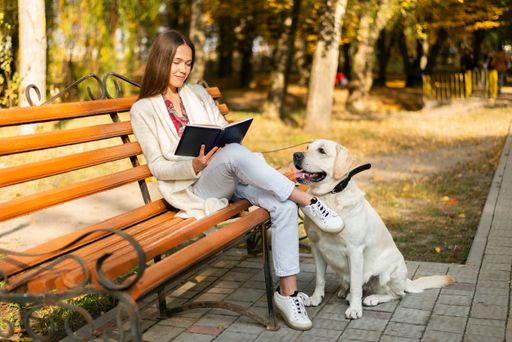Much like humans, your dog may suffer from stress and anxiety. These feelings occur for various reasons, including boredom, loneliness, fear or frustration. Your dog can even sense your tension and become stressed because of it.
While some dogs show anxiety by excessively panting, yawning or trembling, other dogs often deal with stress in more destructive ways. As a pet parent, you have to be proactive to deter your dog from acting out. Fortunately, there are many choices available to help your pup get through stressful times. Here are some practical ways to reduce your pet's anxiety level.
Buy Interactive Products
Does your dog chew on your couch or shoes when you're at work or aren't paying attention to him? These actions might be due to anxiety caused by loneliness. One way to soothe your pup's anxiety is to get him an interactive toy.
Interactive toys have become all the rage. They test your dog's mental skills, keeping your pup entertained for hours. One popular choice is the pet puzzle, which encourages your dog to solve a puzzle to get treats. For most of these toys, your dog must lift or slide blocks to reveal a tasty surprise. Also, consider looking into lick mat ideas for products that will keep your dog distracted. By adding a lick mat to the routine, your dog will be too focused on devouring every last morsel of his delicious treat to worry about anything else.
Exercise With Your Dog
When you exercise, your brain releases endorphins, known as the feel-good hormones; your dog experiences this same process. The release of these hormones is the reason exercising enhances your overall mood. While this biological process alone may improve your pup's stress level, spending time with you is going to boost your dog's spirit the most. Exercising seems like a game to your pup; nothing will make him feel better than playing a game with you — his best friend.
Choosing the workout type depends on whether your main goal is for your fitness or your pup's entertainment. If you're mainly exercising for yourself, take your dog with you on a walk or run. However, if your primary purpose is for your dog specifically, participate in activities that your dog loves, such as fetch or tug of war.
Provide a Crate
Crate training your dog is a great way to reduce anxiety. Dogs instinctively look for small areas to seek shelter, so crates make great safe spaces. If your dog views the crate as a place he can go when he's anxious, such as during a thunderstorm or when you're at work, he'll always be able to calm himself down.
If you want your dog to associate his crate with protection, you need to add some comforting items, such as a blanket or a towel that smells like you. Having your scent nearby will ease his insecurities.
Maintain Background Noise
Complete silence is difficult for anyone to endure. Think about how your dog feels when home alone, silently awaiting your return. Adding music can help your dog decompress during this period. Because soft rock and classical music promote relaxation, they are the best genres to choose from. Avoid hard rock or rap because they can further agitate your pup. Make sure to mix the music up, as listening to the same tunes repeatedly can increase anxiety.
Additionally, putting the television on when you're away can keep your pup's stress level at bay. Animal experts have created programs specifically for dogs. These shows can successfully hold your dog's attention by appealing to his vision and hearing. While relaxation may be the appropriate category for this circumstance, stimulation and exposure are two other popular themes to consider.
Make sure you play music and have the television on for your dog when you're at home and away. This added media may become another anxiety trigger if your pup gets accustomed to hearing it only before you leave.
Don't let your pup feel unnecessary anxiety. Try different techniques to see what works the best for your dog's needs. After discovering which methods help the most, you can keep your pup calm during stressful times.



















